About The Company
EXTERNAL ENVIRONMENT
Water is critical to sustainable development—and it is one of the basic resources which needs to be protected in this age of climate change. Communities today continue to increase in population and density, with more regions transforming into highly urbanized areas. Add on the pressures of market uncertainties, growing competition for existing water sources and tougher regulation—and the importance of inclusive access to clean water and adequate sanitation services becomes more evident. These growing concerns, specifically on maintaining this delicate balance between water security and environmental sustainability, will have long-term effects on the quality of life of millions of people.
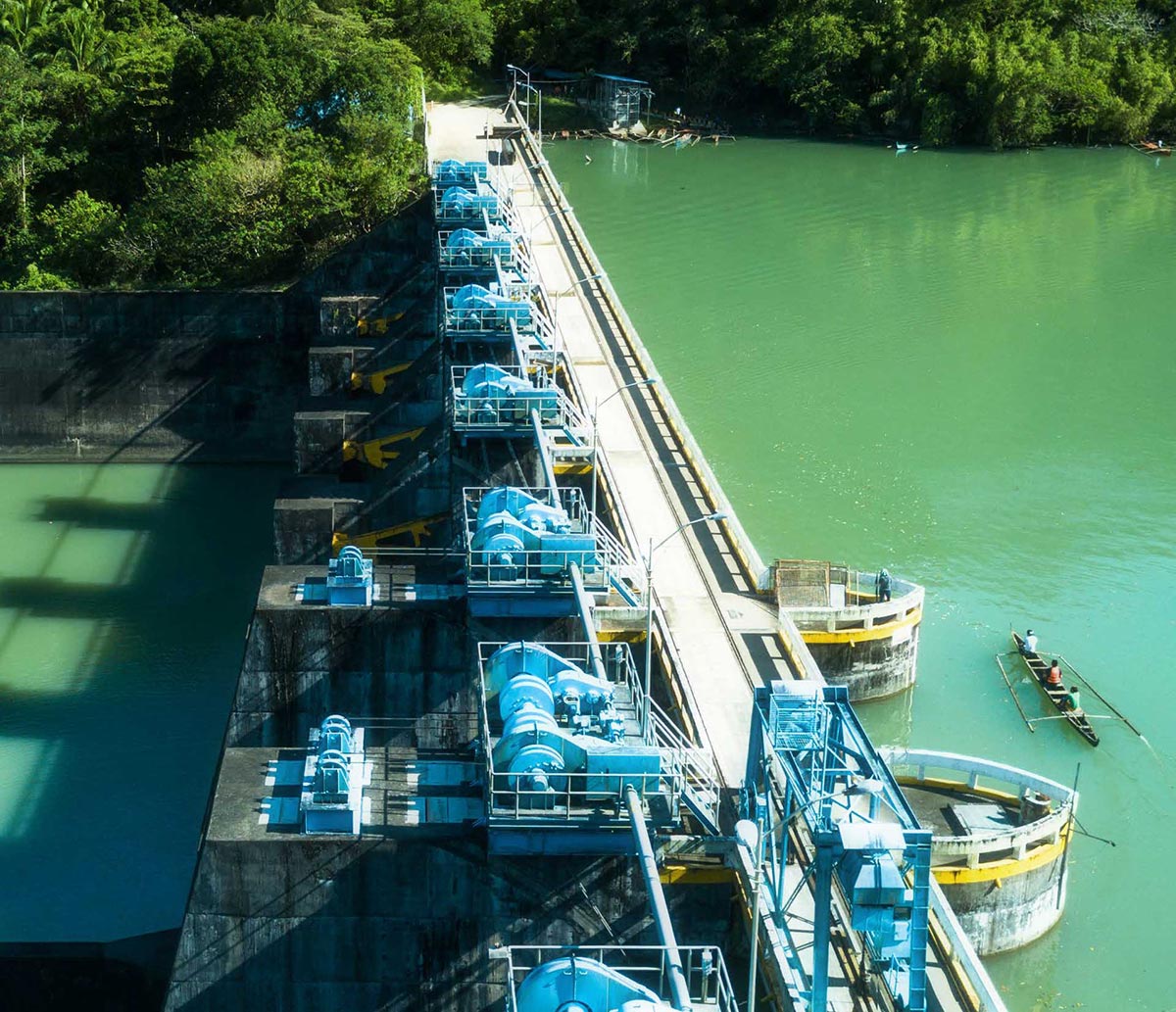
Manila Water recognizes that these realities pose significant risks to the company’s sustainability thrusts and has taken steps to proactively address these issues. The company creates shared value through efficiencies and innovation in its operations. These initiatives embody Manila Water’s commitment to the United Nations Sustainable Development Goals (SDGs) on Clean Water and Sanitation.
In line with this commitment, Manila Water acknowledges the need to improve access to water and sanitation services beyond Metro Manila. In the Philippines, only 85.8 percent of the rural population uses at least basic drinking water services as compared to 96.4 percent in the urban areas.
This is also evident in access to basic sanitation services, with only 71.9 percent of the rural population having access compared to 78.9 percent in urban areas. The same disparity is also evident in most of the ASEAN nations; even more acute in the cases of Indonesia, Vietnam, Cambodia, and Myanmar.
In the Philippines, Manila Water partners with the national and local government in advancing muchneeded societal and policy changes to address the issues of water scarcity and poor sanitation services and used water management. One of the pioneer Public-Private Partnerships (PPP) in the Philippines, the company’s track record and expertise in inclusive access allows it to position itself as a trusted advisor and thought leader in water sector policy reform.
Furthermore, Manila Water actively participated in various committee hearings in the 17th Congress. Apart from submitting the company’s formal position on issues of interest, Manila Water was also called to be resource panelists in the House of Representatives to tackle issues such as water sector reform, disaster preparedness, and improvements to Metro Manila installations. Meanwhile in the Senate, Manila Water also engaged with legislators to push for amendments to the antiquated Public Service Act. The company also presented its compliance with the Supreme Court Continuing Mandamus in Manila Bay.
OUTLOOK AND OPPORTUNITIES
Against this backdrop of social, physical, and institutional challenges, Manila Water remains focused in pursuing its corporate objectives and the growth opportunities in the water and environmental space.
Manila Water’s mandate to its customers has been reaffirmed with the conclusion of the Rate Rebasing exercise in the Manila Concession, its core business. With the approved business plan, the company can now implement continuous improvements and innovations in customer service and business processes, taking advantage of the available technologies in the market. It allows the company to expand its water distribution and sanitation services in the concession area, providing more communities with the critical water and environmental services for inclusive growth.
Business development outside the Manila Concession remains a similar priority both domestically and internationally. Manila Water closed a landmark 13 new business projects locally and regionally, including the largest investment since the Manila Concession: the acquisition of 18.72 percent share in East Water in Thailand. This shows that the non-Manila Concession business is gaining momentum in achieving significant contributions to further bolster Manila Water’s growth.
RISK MANAGEMENT AND GOVERNANCE
Operating in both highly regulated and dynamic business environments, risk management and governance remain as important pillars of the Enterprise to effectively face these external pressures, while taking advantage of the growth prospects.
Guided by the company’s risk strategy, Manila Water implements an Enterprise Risk Management (ERM) Program, based on the global standard ISO 31000:2009, and uses it consistently as a tool for effective decision-making, planning, and daily operations. To aid in the quantification of risks and determine the effectiveness of risk management plans, Manila Water utilizes Key Risk Indicators (KRIs) with regular monitoring and reporting to management. The use of the KRIs enhances the analysis of risk levels and risk mitigation strategies. The status of the KRIs is discussed at the Board level.
The ERM Program has been cascaded to all Manila Water departments. The same has been rolled out to respective subsidiaries in Boracay, Cebu, Clark, and Laguna and our affiliates abroad, while considering the unique business and risk environments wherein these subsidiaries/affiliates operate.
Additionally, with the ERM mindset continuously being assimilated into the company’s culture and practices, ERM has been embedded in key decision-making processes such as insurance management. Manila Water has a risk-based insurance program wherein coverage considers relevant risks and existing controls in place. The integration of ERM with insurance management ensures that insurance provisions in contracts are custom-fit to respond to specific project risks.
To protect the system’s adequacy, suitability, and effectiveness, the ERM Program is reviewed and assessed annually by the Internal Audit Department using a risk maturity assessment framework aligned with global best practices. Manila Water also subjects the ERM system to external assessments as needed.
Throughout the Manila Water Enterprise, business and governance standards are embedded, which resulted in a resilient and agile organization amidst difficulties in the regulatory and physical environments. The company believes that the alignment between its growth aspirations, risk management and governance structures, and the UN SDGs enables the value creation for stakeholders. In doing so, Manila Water continues to evolve into a multinational company with a strong portfolio mindset that is rightly equipped to address the future needs and challenges of the stakeholders.
MANILA WATER’S ERM STRUCTURE
Manila Water’s ERM Program operationalizes the company’s Manual of Corporate Governance which mandates the Board of Directors (BOD) to ensure the presence of organizational and procedural controls, supported by an effective management information and risk management reporting systems. In addition, the company’s Board Risk Oversight Committee (BROC) provides oversight to management functions relating to strategic, financial, operational, compliance, legal, environmental, social, and other risks of the company which involves periodic disclosure of significant risk exposures and related risk management activities.
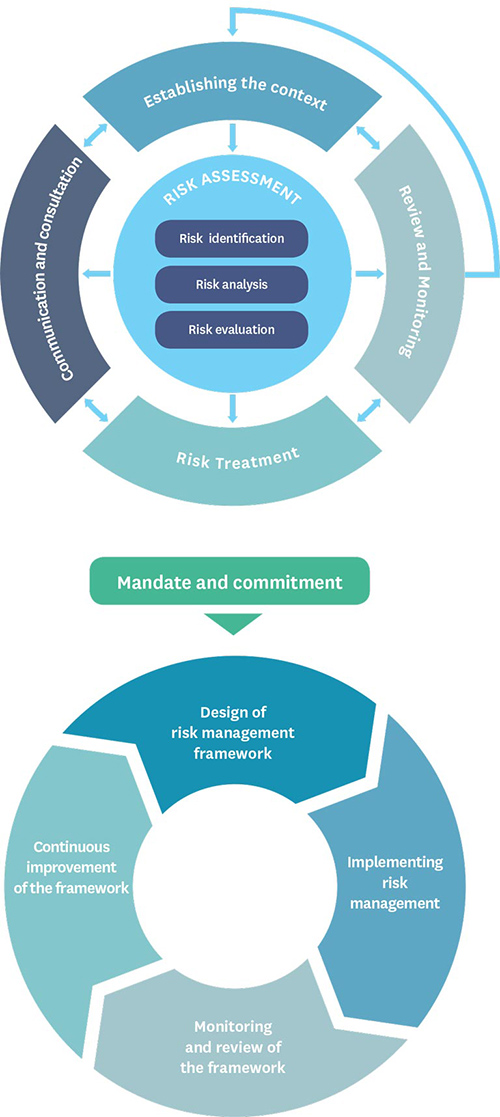
The President is the comprehensive Risk Executive and is ultimately responsible for ERM priorities, strategies, tolerances, and policies. He chairs the Risk Management Executive Committee (RMEC) which is composed of top management and the Chief Risk Officer (CRO). The RMEC provides oversight and input to the President and to the BOD to enable them to formulate informed decisions on matters relating to risks. The RMEC provides direction on the design and implementation of appropriate systems, tools and methodologies to support the ERM process and other risk management activities and designates owners of specific risks and enablers of the ERM process (ERM Champions/Partners/Risk Officers).
The CRO is the ultimate champion of ERM at Manila Water and is supported by the ERM Department. The department is responsible for developing risk management tools, methodologies, and processes and leads the implementation and dissemination of ERM programs across the Manila Water Enterprise in coordination with the risk owners, the CRO, and ERM Champions/Partners/Risk Officers of the business units.
MITIGATING RISKS, MEETING CHALLENGES HEAD-ON
Risk management plays a critical role in Manila Water’s growth and improvement as a leader in the provision of water, used water, and environmental services.
Last year, the company’s efforts were affirmed when Manila Water bagged the Enterprise Risk Management Programme of the Year Award at the StrategicRISK’s Asia-Pacific Risk Management Awards 2018 held in Grand Hyatt Hotel, Singapore. The company’s ERM program was named the best in the region in recognition of the company’s successful enhancement and implementation of the enterprise risk management program, especially its ability to allow the business to remain agile and responsive and its effective integration throughout the Enterprise.
Manila Water does not rest on its laurels, as risks evolve. It continues to face pressures both opportune and potentially detrimental to the company, which test its mettle. Keeping in mind its accountability to shareholders, regulators, employees, and customers, the company managed the following top enterprise risks in 2018, proactively where possible, and came up with actions and solutions.
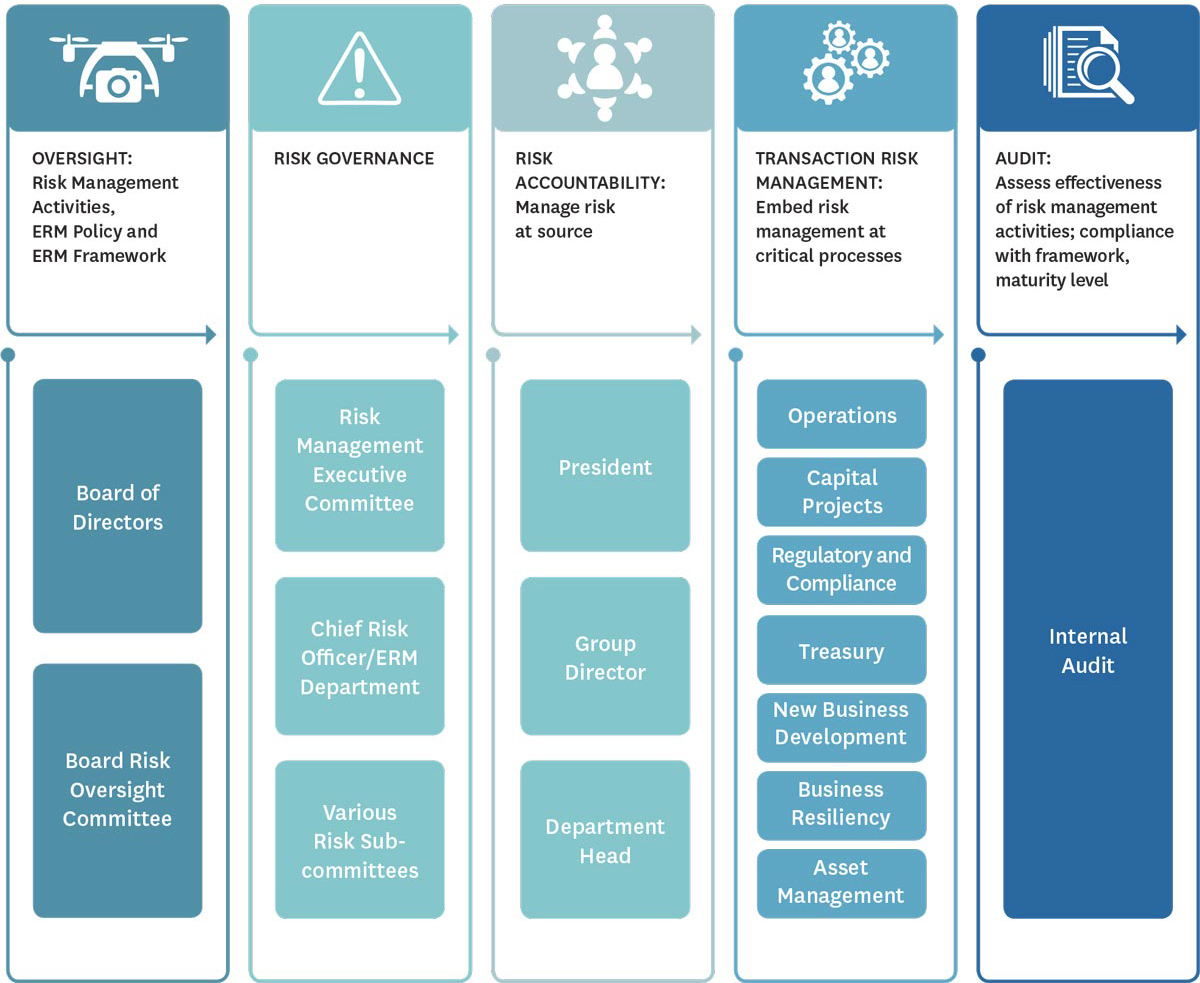
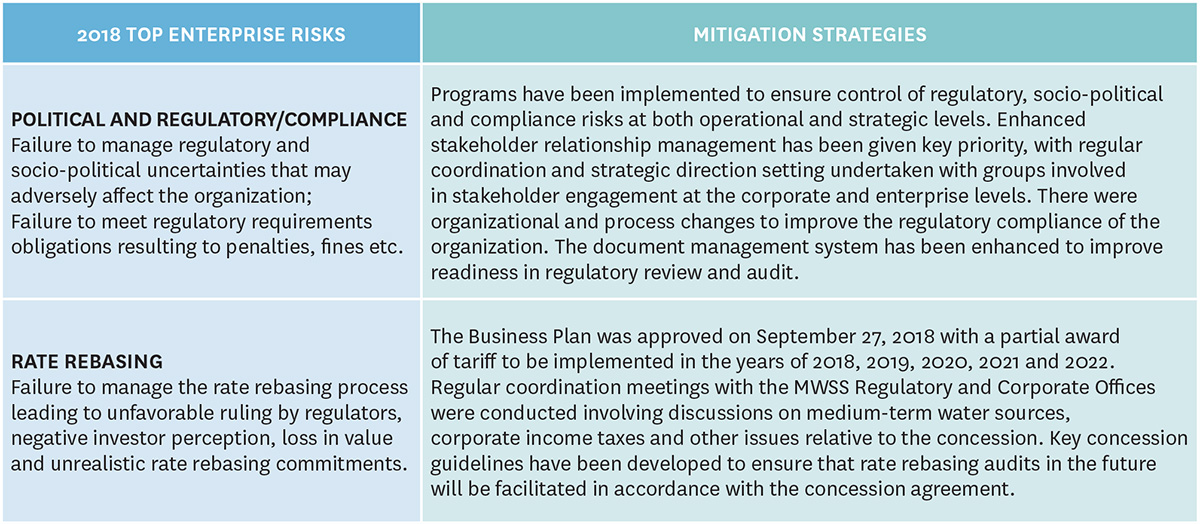
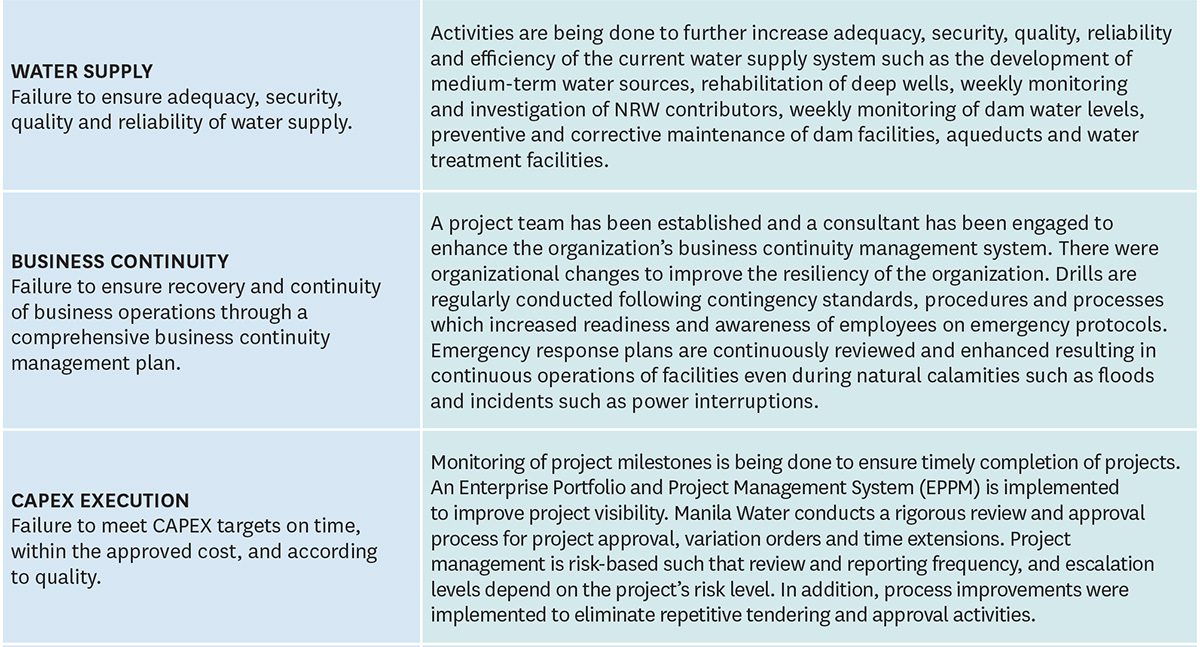
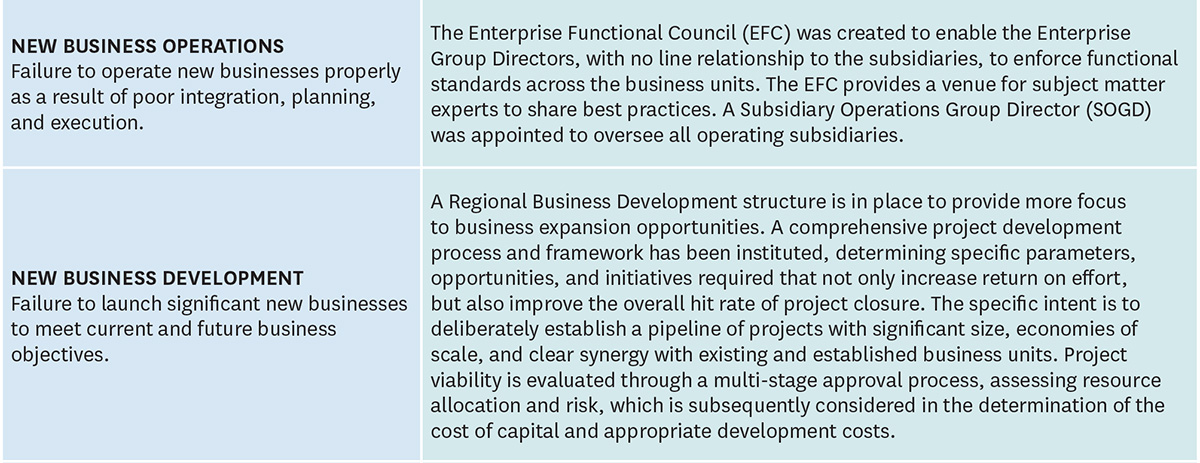
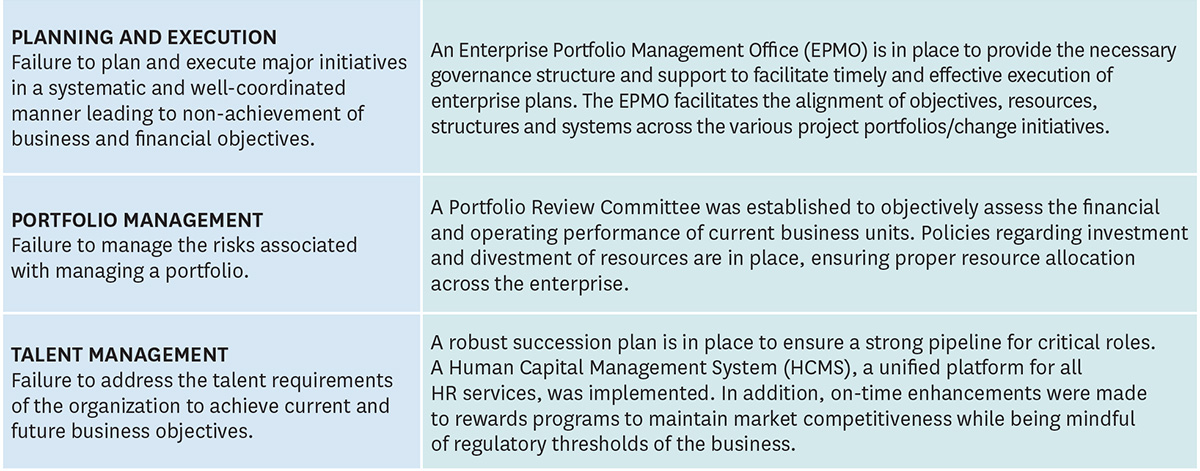
In 2018, the following activities were carried out to further improve the ERM program in the Manila Water Enterprise.
Risk Governance Structure Standardization. The company standardized the risk governance structure across the Manila Water Enterprise. Risk Management Executive Committees (RMECs) were established at Manila Water Operations (MWO), Manila Water Philippine Ventures, Inc. (MWPV), Manila Water Asia Pacific (MWAP), and Manila Water Total Solutions (MWTS). In addition, ERM Policies were developed for MWO, MWPV, and MWAP.
Insurance Program Review. Manila Water had another breakthrough with Vietnam affiliates as the company conducted an insurance program review. The exercise identified gaps in the affiliates’ insurance program, and discussed action items to address such gaps with the respective leadership teams. In addition, the company conducted an insurance management learning session was conducted.
Insurance Program Optimization. ERM Department, in coordination with Laguna Water, optimized Laguna Water’s insurance program. The optimization of insurance resulted in costs savings of ₱2.22 million for 2018 and will be recurring every time the Industrial All Risk policy is renewed. In addition, the project resulted in an enhancement of coverage, which protects Laguna Water’s balance sheet in the event of catastrophic disasters resulting in business interruption.
Maintenance of Quality Management System for Insurance Management. As an affirmation of adherence to global best practices, the ERM Department’s Insurance Management Section successfully passed its ISO 9001:2015 surveillance audit with neither major nor minor non-conformities.
As the company sets its sights on further expanding its reach and footprint, Manila Water continues to engage its talents in finding more cost-effective and innovative ways to manage the risks the company faces.
One such activity is the Gawad Iwas-Lunas: Risk Management Excellence Awards, an internal awards program to recognize individuals, teams, and departments that have significantly embedded risk management and exhibited risk culture in the company. It is the first of its kind within the Ayala Group of companies and with a panel of judges composed of industry professionals and experts.
With sustained active involvement and appreciation of risk management at all levels within the organization, the company is geared up to manage uncertainties in the regulatory, business, and physical environment. The company remains equipped to achieve and seize new business goals as it pursues the crucial role in protecting the environment and enhancing sustainable development, both locally and internationally.